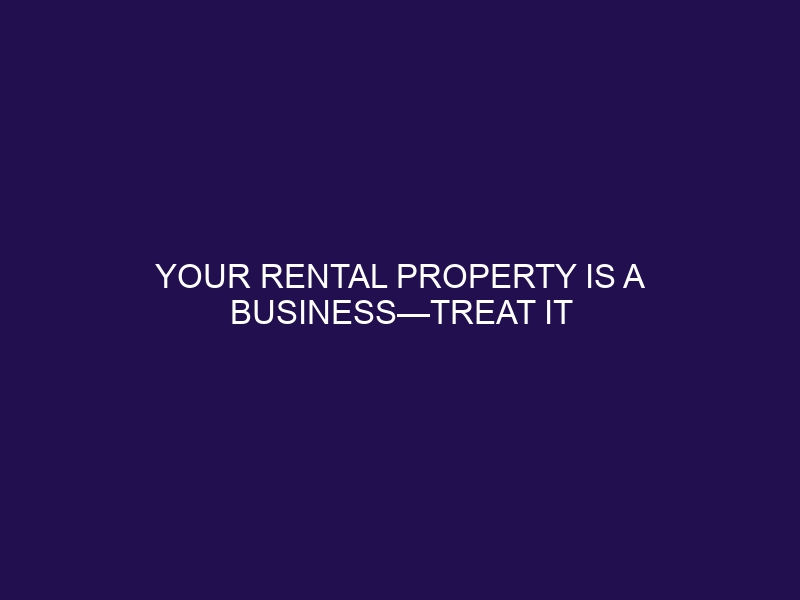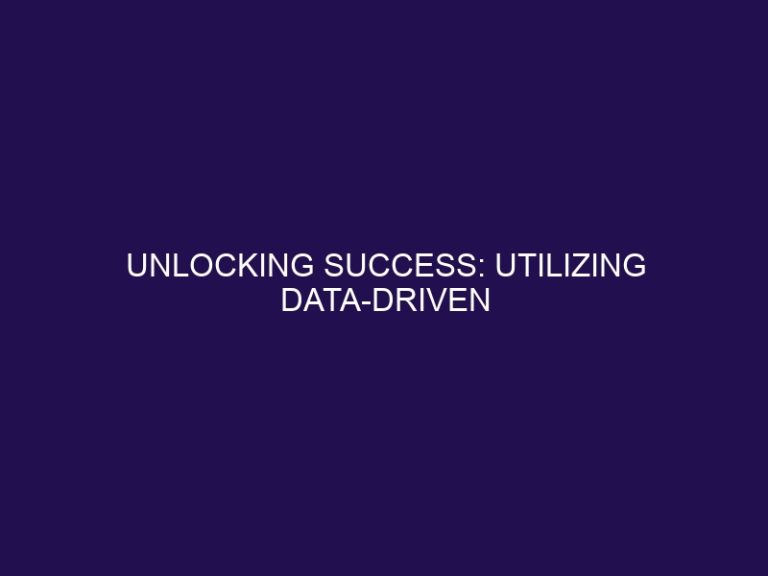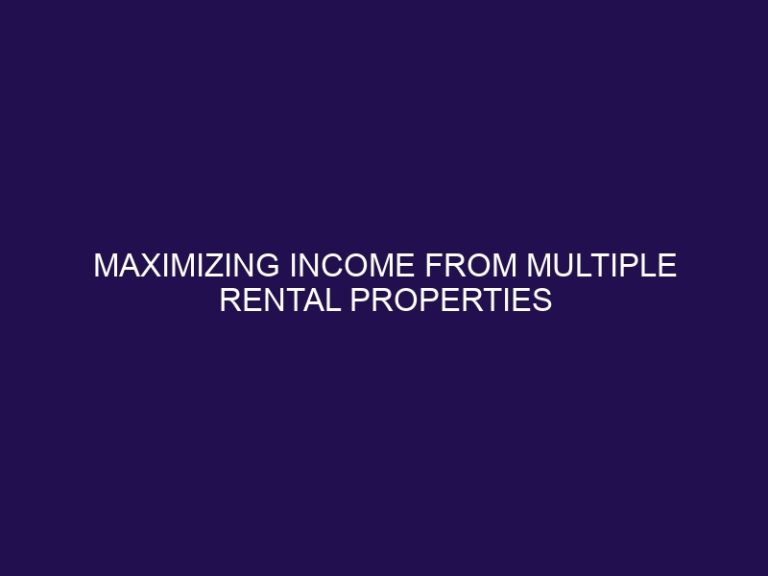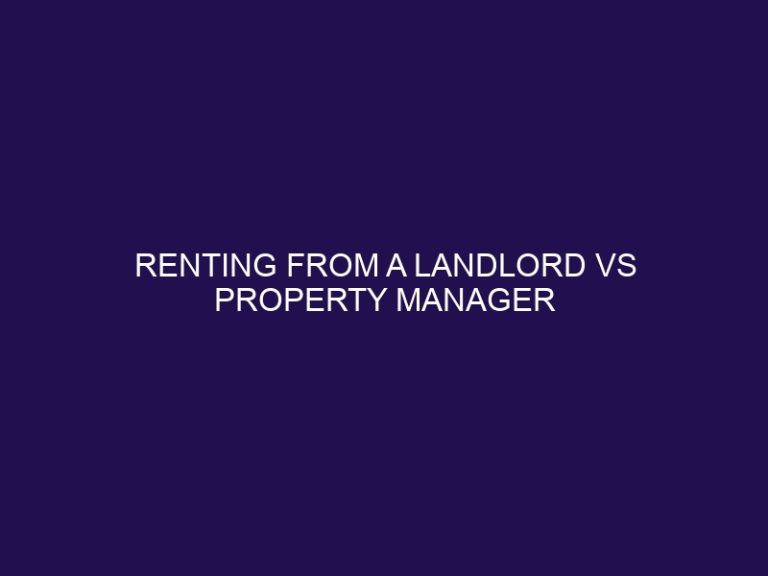Your Rental Property Is a Business—Treat It Like One
Many individuals view their rental property as simply a means of generating passive income, however, it is important to recognize that it is also a business. Whether you own one property or multiple, treating your rental property as a business can bring numerous benefits and improve overall success.
At its core, a business is an entity that generates income through the provision of a service or product. Similarly, a rental property generates income through providing housing for tenants. This can include single-family homes, apartments, or commercial spaces. By recognizing your rental property as a business, you can position yourself for success and take advantage of various benefits.
The benefits of treating your rental property as a business include:
- Legal protection: By establishing your rental property as a business, you can protect your personal assets in the event of a lawsuit or other legal issues.
- Tax advantages: As a business, you may be able to deduct certain expenses related to your property, such as maintenance and repairs, from your taxes.
- Professionalism: Treating your rental property as a business shows a level of professionalism and can attract potential tenants.
- Better organization: By having a structured business plan, you can better manage and organize your property, leading to more efficient operations.
To treat your rental property as a business, there are certain steps you can follow:
- Create a business plan: This will provide a roadmap for your rental property business, outlining goals, marketing strategies, and financial plans.
- Keep detailed records: Accurate and detailed records are essential for any business, including a rental property. This includes expenses, income, and tenant information.
- Separate personal and business finances: Keeping your personal and business finances separate will not only make record-keeping easier, but it also protects your personal assets.
- Have a marketing strategy: Just like any business, you need a strategy to attract and retain tenants. This may include advertising, setting competitive rental rates, and providing quality service.
- Set goals and monitor progress: By setting goals and regularly monitoring your progress, you can make adjustments and ensure that your rental property business is successful.
Not treating your rental property as a business can lead to costly mistakes. Some common mistakes landlords make include:
- Mixing personal and business finances, which can lead to financial and legal issues.
- Not keeping detailed records, which can cause problems with taxes and tenant disputes.
- Not having a marketing strategy, which can result in extended vacancies and lost income.
- Not setting goals or monitoring progress, which can lead to stagnation or a decline in success.
By treating your rental property as a business and following the best practices outlined above, you can increase the success and profitability of your investment, while also protecting yourself and your assets.
Key Takeaways:
Why Is Your Rental Property a Business?
Why Is Your Rental Property a Business? It generates income, requires financial management, and demands legal compliance like any other business. It involves marketing, customer service, and property maintenance, making it essential to treat it with the same diligence and professionalism as any other business endeavor.
What Are the Benefits of Treating Your Rental Property as a Business?
As a landlord, your rental property is not just a piece of real estate, it is a business. Treating it as such can bring numerous benefits and opportunities for growth. In this section, we will discuss the advantages of approaching your rental property with a business mindset. From legal protection to tax advantages, professionalism to better organization, you’ll see how viewing your rental property as a business can enhance your overall experience as a landlord.
1. Legal Protection
- Gain a thorough understanding of landlord-tenant laws to ensure the protection of property rights and effectively handle any disputes.
- Safeguard against liability and property damage by securing comprehensive insurance coverage.
- Ensure legal responsibilities and obligations are clearly outlined by utilizing proper lease agreements and contracts.
2. Tax Advantages
- Deductible Expenses: Enjoy tax deductions for mortgage interest, property taxes, maintenance, and depreciation.
- Pass-Through Tax Treatment: Benefit from pass-through taxation if structured as a partnership or S corporation.
- Depreciation: Utilize depreciation deductions for the property’s wear and tear over time.
3. Professionalism
- Establish a professional brand image for your rental property.
- Deliver exceptional customer service and promptly respond to tenant inquiries.
- Maintain well-kept and visually appealing rental units.
Did you know? Maintaining a high level of professionalism in property management can result in increased tenant satisfaction and retention rates.
4. Better Organization
- Implement a filing system for each property.
- Use digital tools for rent collection and expense tracking.
- Create standardized procedures for property maintenance.
- Establish a centralized communication platform for tenants.
In order to achieve better organization, consider implementing the following strategies:
- Implement a filing system for each property.
- Utilize digital tools for rent collection and expense tracking.
- Create standardized procedures for property maintenance.
- Establish a centralized communication platform for tenants.
How to Treat Your Rental Property Like a Business?
As a landlord, it’s important to approach your rental property as a business rather than just a source of passive income. This means implementing business practices to ensure its success and profitability. In this section, we’ll discuss how to treat your rental property like a business by creating a business plan, keeping detailed records, separating personal and business finances, having a marketing strategy, and setting goals to monitor progress. By following these steps, you can run your rental property more efficiently and effectively.
1. Create a Business Plan
- Create a Business Plan that clearly defines your objectives and goals.
- Conduct thorough market research and analyze the rental property market to gain a better understanding of your target audience.
- Outline your property management strategies and policies to ensure efficient and effective operations.
- Develop a comprehensive financial plan that details income, expenses, and potential investments.
- Create a strategic marketing plan to attract potential tenants and maintain high occupancy rates.
2. Keep Detailed Records
- Document rental income and expenses.
- Keep receipts for repairs, maintenance, and upgrades.
- Record lease agreements and communications with tenants.
A landlord who keeps detailed records of property expenses benefits greatly during tax audits and tenant disputes, highlighting the importance of thorough record-keeping.
3. Separate Personal and Business Finances
- Create a separate business bank account and credit card for managing rental property expenses.
- Maintain distinct financial records for both personal and rental property expenses.
- Avoid using rental income for personal expenses in order to keep personal and business finances separate.
4. Have a Marketing Strategy
- Identify target renters through market research and develop a marketing strategy.
- Utilize online platforms and social media to effectively promote the property.
- Create visually appealing listings with comprehensive details to attract potential renters.
- Offer incentives for referrals or extended leases to increase interest and retention.
5. Set Goals and Monitor Progress
- Set specific, measurable, achievable, relevant, and time-bound (SMART) goals for your rental property business.
- Regularly review and assess your progress towards these goals, making adjustments as necessary.
What Are the Common Mistakes Landlords Make When Not Treating Their Rental Property as a Business?
As a landlord, it’s important to view your rental property as a business rather than just a source of passive income. However, many landlords make the mistake of not treating their rental property as a business, which can lead to financial and legal issues. In this section, we’ll discuss the common mistakes landlords make when they fail to treat their rental property as a business. From mixing personal and business finances to lack of record-keeping and marketing strategy, we’ll cover what to avoid in order to successfully run your rental property as a business.
1. Mixing Personal and Business Finances
- To avoid mixing personal and business finances, it is important to open a separate business bank account.
- Using distinct credit cards for personal and business expenses can also help keep finances organized.
- Keeping detailed records of all income and expenses, clearly differentiating between personal and business transactions, is crucial.
- For personalized guidance on managing personal and business finances, it is recommended to consult a financial advisor.
A friend experienced complications with taxes and financial stress due to mixing personal and business finances. Seeking professional advice and restructuring accounts helped resolve the issue.
2. Not Keeping Detailed Records
- Utilize property management software to maintain detailed tenant records, lease agreements, and rent payment history.
- Keep track of all property expenses and income, including repairs, maintenance, and rental income.
- Maintain thorough documentation for tax purposes, such as receipts and invoices.
3. Not Having a Marketing Strategy
- Identify target renters and tailor advertising to reach them.
- Utilize online platforms and social media for property promotion.
- Highlight unique property features in marketing materials.
- Offer incentives or referral programs to attract tenants.
- Regularly assess and adjust marketing strategies for effectiveness.
In the 1950s, real estate marketing saw a shift towards TV and radio advertisements, expanding the reach of property promotions. However, not having a marketing strategy can greatly hinder the success of these promotional efforts. It is important to have a clear plan in place and regularly assess and adjust it for maximum effectiveness.
4. Not Setting Goals or Monitoring Progress
- Set Clear Goals: Define specific objectives for rental income, property maintenance, and tenant satisfaction, in order to avoid the mistake of not setting goals or monitoring progress.
- Monitor Progress: Regularly assess financial performance, property condition, and tenant feedback to track progress and ensure that goals are being met.
Frequently Asked Questions
What are the key principles for treating a rental property like a business?
The key principles for treating a rental property like a business include being proactive, beginning with the end in mind, and putting first things first. These principles are outlined in Habit #1 of “The 7 Habits of Highly Effective People” by Stephen Covey. Being proactive means taking initiative and not waiting for things to happen. Beginning with the end in mind involves setting clear goals and having a plan to achieve them. Putting first things first means prioritizing important tasks over urgent ones.
How can a rental rider protect against potential lost rent?
A rental rider is a type of insurance that can be purchased to cover lost rent in case of a loss at the rental property. By notifying your insurance provider and purchasing a rental rider, you can protect your income and prevent financial losses due to unexpected events. This is important for treating your rental property like a business and ensuring its success.
What are the tax rules for rental properties?
The tax rules for rental properties can be complex and vary depending on the classification of the property. Rental properties can be classified as investments or businesses, with different tax implications for each. It is important to have a good understanding of these rules and properly track expenses in order to maximize tax deductions and minimize tax consequences.
How can hiring a management company affect the tax consequences of a rental property?
Hiring a management company to handle the day-to-day operations of a rental property may affect the tax consequences. The IRS distinguishes between “active” and “passive” participation in rental activities, and those who materially participate in the property can deduct up to $25,000 against other income. However, hiring a manager may limit the ability to deduct losses, as the owner is not directly involved in the management activities. It is important to understand these potential consequences and make informed decisions when managing a rental property like a business.
What are the distinctions between repairs and improvements when it comes to tax write-offs for rental properties?
There is a difference between claiming a repair and an improvement when it comes to tax write-offs for rental properties. Repairs can be deducted in the same year they are incurred, while improvements must be depreciated over a period determined by the IRS. It is important to carefully track expenses and understand the tax implications of rental income in order to properly claim these deductions.
How can treating a rental property like a business lead to a successful experience?
Treating a rental property like a business involves having a business mindset and following key principles for success. This includes being proactive, beginning with the end in mind, and putting first things first. By properly managing and maintaining the property, understanding tax rules, and treating the property like a business, it can lead to a successful and profitable experience for the owner.







